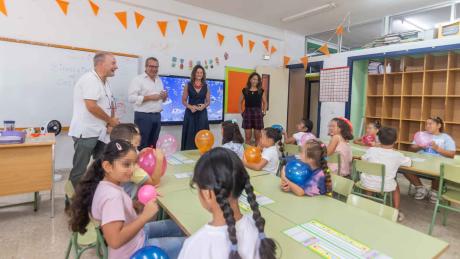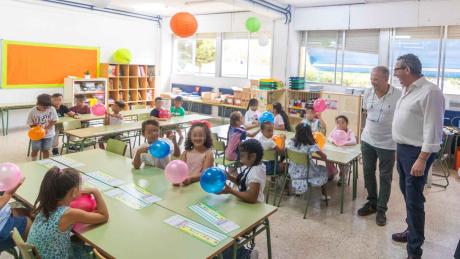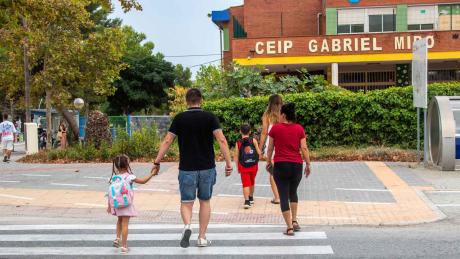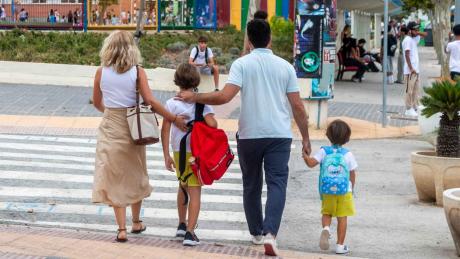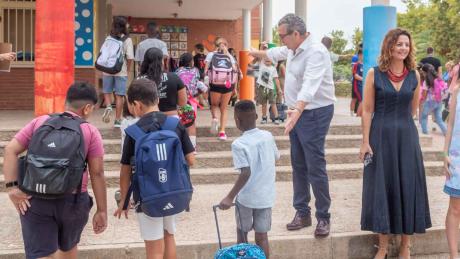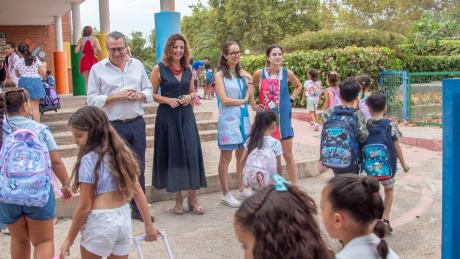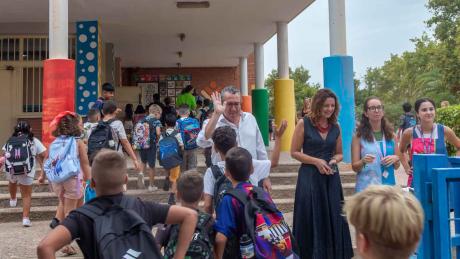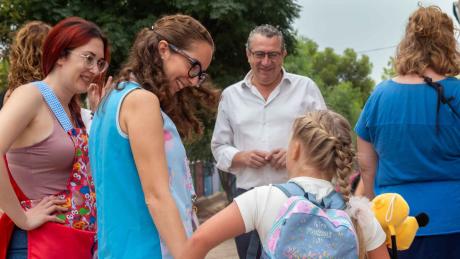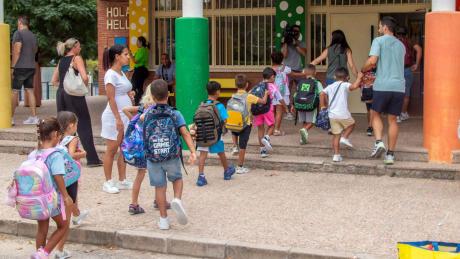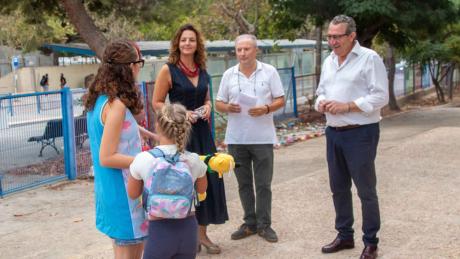The city opens a new classroom to promote the integration of students with specific needs, located at Gabriel Miró Primary School
More than 10,000 children and teenagers begin the school year in Benidorm schools and colleges
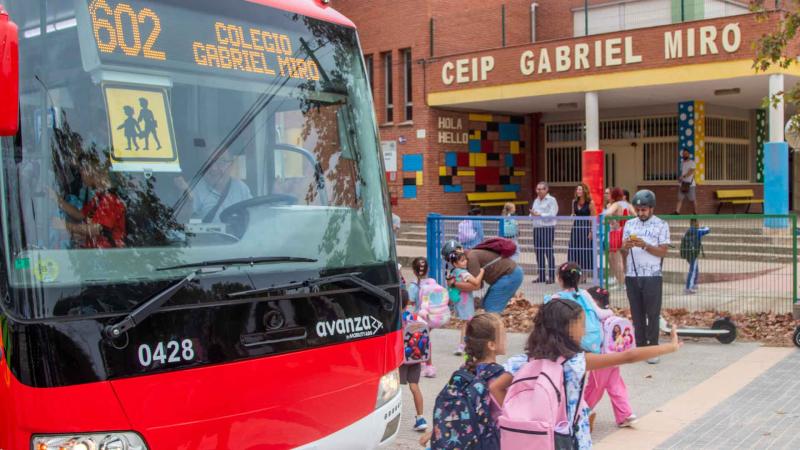
Mayor Toni Pérez highlights the "extensive public education network" in Benidorm, which includes 19 publicly funded Early Childhood, Primary, and Secondary education centres
More than 10,000 children and teenagers began the 2025-2026 academic year in Benidorm's Early Childhood, Primary, Secondary, Baccalaureate, and Vocational Training school centres this Monday after the summer holidays. The day proceeded normally in the city's 19 publicly funded centres, marked by excitement among students, teachers, and families. This was especially true for the more than 520 children who joined the 3-year-old preschool classrooms for the first time today, and the 90 who joined the five 2-year-old classrooms located in preschool and primary schools.
The Mayor of Benidorm, Toni Pérez, welcomed the new school year with the Councilor for Education, Maite Moreno, at CEIP Gabriel Miró, one of the two schools serving students of various nationalities and which, this year, also debuted one of the so-called UECO classrooms (Specific Unit in a Regular School) to serve and facilitate the integration of students with specific needs. There, he greeted students, teaching staff, and families and toured the facilities of this new unit, where he learned about all its specific features from the director and head of studies, David Ivorra and María Signes.
The mayor emphasized that this classroom joins the UECO classrooms already operating for Preschool and Primary at the Mestre Gaspar López, El Murtal, and Ausiàs March schools, and for Secondary at the Beatriu Fajardo de Mendoza and Mediterrània secondary schools, "weaving a network with which we continue to take steps toward greater inclusion, in this case by expanding the care of students with special needs in mainstream schools and guaranteeing the principles of quality, equal opportunities, equity, and universal accessibility to education."
Likewise, she has taken advantage of this first school day of the course to highlight the "immense volume of boys and girls starting the course today, spread across a large network of public educational centers in Benidorm, perhaps one of the cities with the largest number of publicly funded centers, proportionally and compared to others of its size": fourteen preschool and primary schools and five institutes that teach secondary, high school, and vocational training.
Toni Pérez expressed his hope that this 2025-2026 academic year will be "a great one for the entire educational community" and thanked the staff at all the local schools, "embodied today by Gabriel Miró, for their empathy, solidarity, kindness, and welcome on this first day of school, because all these values are also everything that Benidorm represents."
Of the total number of children who returned to the classroom today, 1,599 are in the second cycle of Early Childhood Education; 3,785 are in Primary Education; and around 4,600 are in Compulsory Secondary Education, Baccalaureate, and Vocational Training courses taught in publicly funded schools. They are also joined by "all children aged 0 to 2 who have obtained a place in the three municipal nursery schools or in the Early Childhood Care Service and who are gradually joining these days," said Pérez, who noted that for all of them "education will once again be completely free this year, thanks to the commitment of the City Council and the Generalitat Valenciana to early schooling."
Finally, the mayor stated that, once again this year, the City Council has implemented or will implement various grants worth half a million euros to "reduce as much as possible the expense that returning to school represents for many households and to promote work-life balance, maintaining our commitment to the families of Benidorm and providing them with aid and support measures, increasing them according to need, especially in places where no other administration reaches," the mayor stated.
Aid to families and measures to promote conciliation
Regarding this matter, the Councillor for Education announced that this year, nine public schools will offer both "Morning School" and "Afternoon School" services, extending the schedule beyond school hours to promote work-life balance for many families who have to drop their children off at school before 9 a.m. or pick them up a little after 5 p.m." This service, which is being developed in collaboration with the FAMPA Marina Baixa (Family-run Primary School of El Murtal, La Cala, Ausiàs March, Vasco Núñez de Balboa, Serra d'Aitana, Bautista Lledó, Puig Campana, Els Tolls, and Serra Gelada, "some with both services and others with just one, depending on the demand of each centre," she added.
In addition, Maite Moreno reported that, to date, the Local Government Board has approved 887 individual grants of 63 euros for the purchase of school supplies for the second cycle of Early Childhood Education. This applies to children aged 3 to 5 registered in Benidorm. However, she noted that "the application period remains open until September 30, so there are still families eligible."
Likewise, the Local Government Board has also approved a subsidy of 159,000 euros to subsidise school transportation for students in Early Childhood, Primary, and Secondary education at the Salt de l'Aigua complex, which houses the Mestre Gaspar López and Gabriel Miró public schools and the Pere Maria Orts i Bosch, Bernat de Sarrià, L'Almadrava, and Beatriu Fajardo secondary schools, as well as for students at the IES Mediterrània. With these grants, which reached more than 750 students last year, "100% of the service cost is covered for students in the second cycle of Early Childhood and Primary Education, who travel free of charge, and part of the price is covered for Secondary, Baccalaureate, and Vocational Training students, who must submit their application to City Hall."
The City Council has also processed grants to cover part of the psychopedagogical treatment for students with special needs or behavioural or learning problems or disorders. These grants can reach €2,000 per child, and 160 children benefited from them last year, with a municipal investment of €195,860. Grants are also allocated to cover educational support for primary and secondary school students with poor academic results, which reached a total of 230 children last year, with a total amount of €69,000. Maite Moreno stated that "we are aware of the financial strain that going back to school represents for many families, which is why the City Council is setting aside almost half a million euros to support households each year, both at the beginning of the school year and throughout the rest of the year." The councilor also reiterated her "firm commitment to continue working to ensure that education is an accessible and equal opportunity for all children and adolescents in our city."
Improvements in the centres
Ahead of the start of the 2025-2026 school year, the Benidorm City Council has carried out renovation and improvement works at various educational centres in the city. Classrooms have been painted; fences, pillars, and playgrounds have been repaired; a gymnasium roof has been replaced; and flooring has been refurbished, with an investment of €168,856. In addition, nearly 80 classrooms have been adapted for the installation of the 115 interactive panels that the Ministry of Education has added this year to ten preschool and primary schools to advance the Interactive Digital Classroom project.
Likewise, ten schools and secondary schools in Benidorm will participate in two programs promoted by the Ministry to strengthen their students' reading comprehension and mathematical skills.
